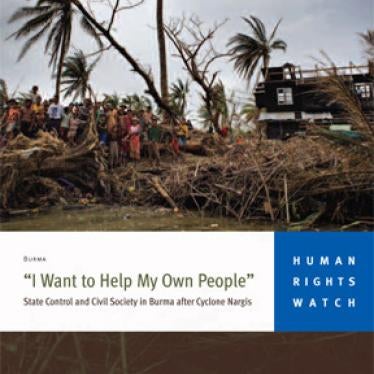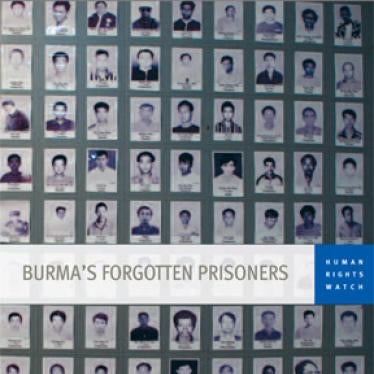(New York) - On the twentieth anniversary of Burma's historic 1990 elections, the Burmese military government shows no signs of relaxing its stranglehold on power, Human Rights Watch said today.
Elections planned for 2010, the first in 20 years, appear designed to enshrine military rule with a civilian face, Human Rights Watch said.
"The 1990 elections sent a clear message to the Burmese military that the people wanted them out of power," said Elaine Pearson, deputy Asia director at Human Rights Watch. "The generals won't make the same mistake twice. The past 20 years have been a stage-managed process to ensure the military controls the future parliament."
On May 27, 1990, surprisingly free and fair elections in Burma resulted in a resounding win for the opposition National League for Democracy (NLD), which secured 60 percent of the popular vote and 80 percent of the parliamentary seats (392 out of 485). The NLD will not contest the 2010 elections because of new laws aimed to deter the opposition from running and the imprisonment of many party members, including NLD leader Aung San Suu Kyi.
Burma's military government refused to recognize the result of the 1990 elections and claimed that the vote was only to form an assembly to draft a new constitution, not for a parliament. In the ensuing months, the military government arrested and imprisoned dozens of opposition parliamentarians, while scores fled Burma to seek refuge abroad.
The government's tightly-controlled process of drafting a new constitution dragged on for 14 years. The ruling State Peace and Development Council announced its "Seven Step Road Map to Disciplined Democracy" in August 2003 as a renewed plan to complete the constitution and prepare for future elections. In many of his public speeches, the Burmese president, Senior-General Than Shwe, talked about moving the country to "discipline flourishing democracy" in which the military would have a central role.
Those who participated in the constitutional drafting process did so at great personal risk. Twelve members of parliament who won seats in 1990 remain in prison in Burma today, including 10 NLD members. Hkun Tun Oo, the leader of the Shan Nationalities League for Democracy, and Kyaw Min (aka Marmaud Shaoshu Arnolgula Haud), an ethnic Rohingya Muslim from Arakan state, were arrested in 2005 even though both had attended the national convention and tried to work within the military government's reform process. Each was sentenced to long prison terms: Hkun Tun Oo received 93 years' imprisonment for treason, and Kyaw Min received 47 years for immigration offenses.
The new constitution was approved by a nationwide referendum in May 2008, just weeks after the devastating Cyclone Nargis, in a process marked by intimidation and irregularities.
"The military junta has tried to erase the memory of the 1990 elections by imprisoning those who won and excluding political prisoners from the process," Pearson said. "What the generals call ‘disciplined democracy' is stage-managing a result and ordering the Burmese people to accept it."
Human Rights Watch urged Burma's close diplomatic and trade allies, particularly China, India, Russia, and Singapore, to exert pressure on the military government to pursue a genuinely open political reform process, and to not endorse the upcoming elections. Criticism of the electoral process has been recently voiced by the European Union Parliament in a resolution on May 19, by the United States Assistant Secretary of State for East Asia and the Pacific Curt Campbell during his recent visit to Burma, and by United Nations Secretary-General Ban Ki-moon. Human Rights Watch called upon the international community to impose more calibrated and targeted sanctions on the Burmese leadership, the military, and their close business associates as the most effective way to pressure the military government ahead of the elections.
"Only the most cynical of governments could endorse Burma's deeply flawed process," Pearson said. "On the twentieth anniversary of a crushed election, Burma's friends should insist on the immediate release of political prisoners and an inclusive and credible political process."
Background information
Five electoral laws released in March 2010 set the ground rules for the election expected in late 2010. The Political Party Registration Law (SPDC Law No.2/2010, Chapter 1. 2(I)) prohibits political parties from having members who are currently serving prison terms or detention orders. These compelled the NLD to refuse to register their party for the 2010 elections, even though the party had struggled to retain its legal status for 20 years after it won the 1990 elections.
The newly formed Electoral Commission overseeing political party registration lacks independence since it is comprised of officials close to the State Peace and Development Council. More than 37 political parties have registered to contest the elections. These include the National Unity Party, which won 21 percent of the vote in 1990, several ethnic parties such as the Pa-O National Organization and Kokang Democracy and Unity Party, and a pro-government Wunthanu (Patriotic) National League for Democracy, comprised of some former NLD members.
In late April, the Burmese prime minister, Gen. Thein Sein, and more than 20 serving senior generals with ministerial portfolios, resigned from their military posts and registered the Union Solidarity and Development Party to contest the elections. The new pro-government party mirrors the mass-based social welfare organization Union Solidarity and Development Association (USDA), formed by the military in 1993 and now comprising more than 24 million nominal members nationwide. Paramilitary forces part of or associated with the USDA have been used to intimidate and harass the opposition, most notably in the violent attack against Aung San Suu Kyi's motorcade in Depayin in upper Burma on May 30, 2003, and during the crackdown against monks and protesters in September 2007.
There are currently more than 2,100 political prisoners in Burma, including 428 members of the NLD arrested and sentenced since 1990, 253 monks, 282 student leaders, and prominent dissidents such as Min Ko Naing, Burma's famous comedian and social activist Zargana, poets, bloggers, labor activists, and doctors. Human Rights Watch's campaign 2,100 in 2010 aims to highlight the plight of these 2,100 prisoners and press for their unconditional release ahead of the elections.
Conditions in Burmese prisons are desperate, with torture and mistreatment, poor sanitation, inadequate health care, and irregular visits and food supplies from family members. More than 120 political prisoners are in poor health. Political prisoner Ko Kyaw Soe, age 39, died on May 19, 2010, in Myingyan prison near Mandalay due to prolonged ill-treatment in custody.








